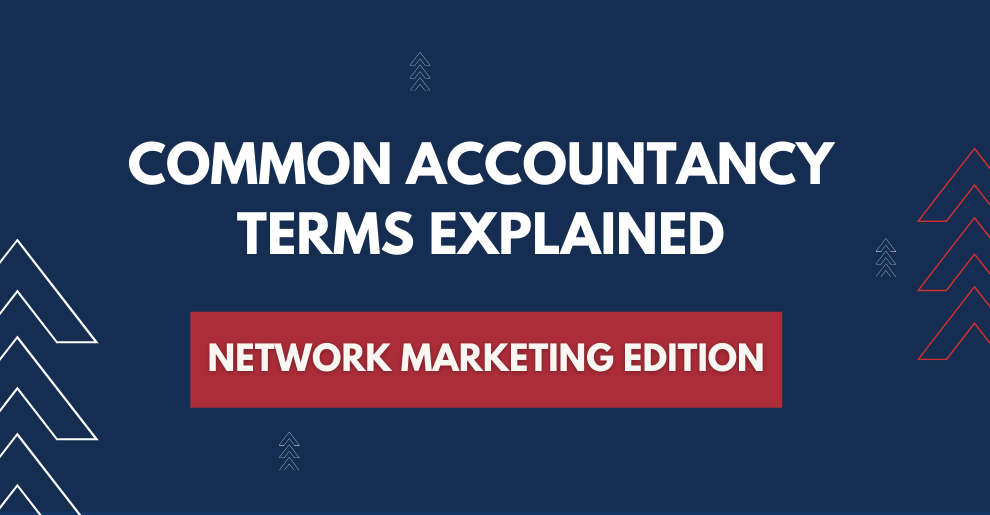Running a Network Marketing business brings with it tax and accounting obligations. Regardless of whether you use an accountant to handle your affairs, or whether you manage them yourself, you may come across some unfamiliar terminology.
Here, we explain what some of the most commonly used accountancy terms actually mean. This is not a complete glossary of accountancy terms, but they are the terms that we use frequently when dealing with our Network Marketing clients.
Accounts
These are financial statements that are prepared at the end of a given period to detail profits and losses and summarise your financial position.
Accounting period
This is the time period that is covered by your accounts, usually a full 12 month period.
Business structure or trading style
This is the legal structure through which your business operates. The most common business structure in Network Marketing is sole trader which is another term for a self-employed individual. Other styles include partnerships, limited company and Limited Liability Partnership (LLP). You can find out more about trading styles in this blog. Businesses operating as limited companies or LLP’s need to register with Companies House, and all businesses need to register with HMRC as soon as they start trading.
Expenses
Costs that you incur as part of the everyday running of your business. Some of your business expenses are tax-deductible which means that you can deduct these items from your taxable income, therefore lowering your overall tax bill. Refer to our guide on expenses for Network Marketers for more information.
Financial Year
This is the period of time covered in your annual accounts, usually 12 months. You can choose what financial year your accounts cover, but there can be advantages to choosing a particular period depending on your circumstances, so it’s best to ask a professional. It’s often a good idea for sole traders to choose their financial year to coincide with the tax year which runs from 6th April to 5th April of the following year.
Gross Profit
Your business’s total revenue minus the cost of sales.
Making Tax Digital (MTD)
MTD is the Government’s initiative to digitise the way they administer tax. It is being rolled out in different stages. Find out more about how self-employed Network Marketers will be affected by MTD in this blog.
Self-Assessment Tax Return (SATR)
Self-assessment tax returns are HMRC’s way of calculating the income tax due from sole traders, partners in a business partnership or individuals who receive income in addition to their wages or pensions. This could be property rental income, tips and commission or other income from savings, investments or dividends. The deadline for submitting this to HMRC is 31st January to cover activities in the previous tax year.
Trading allowance
The trading allowance is the amount of income you can earn through self-employment but do not need to complete a tax return. In the UK, this is currently £1,000 per year.
Turnover
Also referred to as income, this is the total sales of your business’s operations. In Network Marketing, this is typically made up of sales of products or services, and commission.
Unique Taxpayer Reference (UTR)
Your UTR is a unique code assigned to you by HMRC. It consists of 10 digits and helps HMRC identify your business when dealing with your tax affairs. If you have never completed a self-assessment tax return, you will need to request this before submitting your first one – or we can do it on your behalf.
All of our Network Marketing clients receive unlimited advice from our experienced team as part of our Helpline Service. We are used to answering common questions and are always happy to provide detailed explanations.
